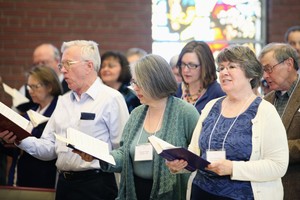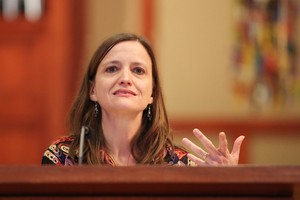Singing the hymns of the church gives congregations not just words about God’s “mighty acts” but “has something to teach us in our very bodies about the workings of God’s grace,” theologian Martha Moore-Keish told a crowd of more than 200 gathered at Harvey Browne Memorial Presbyterian Church here for the sixth and final formal celebration of the new Presbyterian Church (U.S.A.) hymnal, Glory to God.
In two keynote addresses March 14 and 15, Moore-Keish ― associate professor of theology at Columbia Theological Seminary ― led attendees on a grand, singing tour of Glory to God, inviting them “to hear the theological heartbeat of this hymnal: the rhythm of God’s grace and our gratitude.”
Moore-Keish began with the opening hymn in Glory to God ― “Holy, Holy, Holy” ― which she said is one of the first hymns she remembered singing growing up. “I remember before I understood them the delicious taste of these words in my mouth.”
Glory to God concludes with “Siyahamba.”
“This South African freedom song repeats with joy, over and over: ‘we are marching in the light of God,’” Moore-Keish said. “Holy, holy, holy is our God ― and so we are marching in the light of that God. Those are the bookends of our faith, and that’s the wisdom of our new glorious hymnal.”
Glory to God emphasizes “that the God we worship is a God of grace, whose giving knows no ending,” Moore-Keish said, leading attendees in a couple verses of “God Whose Giving Knows No Ending (#716 in the book), which she described as “a perfect summary of this theological emphasis that is distinctive to our Reformed tribe.”
Presbyterian and Reformed theology ― and so Glory to God ― stresses the Trinity, “Christians, after all, only came to sing ‘God in three persons, blessed Trinity’ as the result of what they saw God doing in history. For centuries, the people of Israel proclaimed ‘The Lord our God, the Lord is one,’ … sent them judges and kings, priests and prophets, and finally a messiah, Jesus of Nazareth.”
Again at Pentecost, Moore-Keish continued, “the earliest Christians received the fire and breath of the Spirit of God in a new way — and yet this too was the same God they had known through creation and covenant, law and prophets.”
The mighty acts of this triune God are the focus of the whole first part of Glory to God, Moore-Keish said, leading attendees in the singing of “I Sing the Mighty Power of God” (#32) and “When Israel was in Egypt’s Land” (#52).

Hymnal celebration participants sing from "Glory to God." —Danny Bolin
The hymnal then moves to the second person of the Trinity ― Jesus Christ ― which Moore-Keish said demonstrates that God’s acts were “not just mighty, but mighty peculiar.” For instance, as the hymn “No Wind at the Window” (#101) relates, she said, “We encounter a mighty peculiar act of God ― the selection of an unwed teenager to mother the Savior. And Mary simply replies “yes.”
And in “You, Lord, Are Both Lamb and Shepherd” (#274), Moore-Keish said after attendees sang that hymn, “Here, in four short verses, we have a summary of the mighty acts of what God did in Jesus Christ.”
Such might, she said, “is only seen through the liberation of a small people, of a teen-aged mother, of a humble rabbi ― bearing new life into the world ― and those mighty acts continue into the present through the Holy Spirit. She punctuated the point by leading attendees in the singing of “Spirit” (#291) and “Come, O Spirit, Dwell Among Us” (#280).
The very act of singing is a physical manifestation of God’s grace, Moore-Keish insisted. “This quality of music reveals much to us of God’s grace, an acoustic space that forms us from the outside in, creating the space we can call home,” she said. “When we sing we are acutely aware of not being on our own, of belonging to something far bigger than us that we cannot control. When we sing together, we experience God doing things in us we cannot do ourselves.”
Believers’ response to such grace ― and the theme of the second part of Glory to God, Moore-Keish said, is gratitude. This is exemplified ― as attendees sang ― in “God Whose Giving Knows No Ending” (#716).
“‘Gifted by you we turn to you offering up ourselves in praise,’” she said, “teaches about God’s grace that shapes us and moves us to do something. Music has the power to move us and surround us ― it quite literally moves us to action. When we plant ourselves in its presence, it empowers us to action.”
But even as God’s mighty acts seem at times peculiar, so is our response, Moore-Keish said. “One mystery of life is that we are actually most fully ourselves when we are in God, not when we are independent, free agents. Our true selves are truly not just our selves. Our response is itself built on God’s prior grace.
Glory to God exemplifies this mystery in such hymns ― which were again sung by attendees ― as “We’ve Come This Far by Faith” (#656), “Faith Begins by Letting Go” (#684), “For the Troubles and the Sufferings” (#764) and “Heaven Shall Not Wait” (#773).
“Our grateful response is not always upbeat or joyful,” Moore-Keish admitted. “Response to God’s grace also includes facing honestly and weeping over the painful losses of our lives. In this regard, Glory to God provides some real gifts of new congregational song that give music and words to the most difficult moments of our lives.”
To illustrate, she led attendees in “God Weeps with Us Who Weep and Mourn” (#787) and “When Memory Fades” (#808) about the cognitive losses that come with aging. “In the very singing we affirm that our griefs deserve to be voiced, not hidden from God, that we are not death-deniers,” she said. “God here is not just suffering with us, but God is one of deep, faithful compassion, who can be trusted to be there no matter how hard we cry. Our response, again, is not ours alone but God’s patient courage and untiring arms.”
All of this is both the power and gift of Glory to God, Moore-Keish said. “Music is a force that surrounds us and changes us from the outside in, and as a power that nourishes us and changes us from the inside out.
“If we really open ourselves to the music, whether as listeners, players, singers, or toe-tappers, we know that music does not just leave us where we are. Music has the capacity also to empower us and move us somewhere.”
There are two basic ways “that music works on us that reveal something about God’s grace and our response,” Moore-Keish said:
- First, congregational singing has the power to draw us together from isolation into one larger whole, such as during the civil rights and anti-apartheid movements.
- Second, music has the power to evoke hope and lead us forward.
“Isn’t that what Christian worship is supposed to be about,” Moore-Keish said, “leading the people of God not just into a powerful experience, but into transformed lives so that we may witness to the resurrection?”

